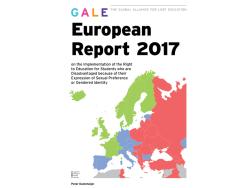GALE publishes first overview of LGBTI education in Europe

24 December 2017 - Today GALE published the first full overview of how European States implement the right to education for LGBTI (DESPOGI) students. About one third of the States (15) were rated as "supportive", as many were rated as "ambiguous" and slightly more (17) were scored as "denying". Peter Dankmeijer, author of the report and director of GALE comments: "It is good to see significant progress in a number of States. It shows strategic action with cooperation between NGOs, the education sector and the government works: schools can change. But the report also shows a lot remains to be done."
Overview
The report counts 412 pages. Data, opinions and feedback on the report were delivered by over 300 local respondents. The new "map" shows how Europe seems to be divided in three "bands", a band of supportive countries in the West, a band of ambiguous countries in the middle and a band of denying countries in the East. "The wider backlash in democratic values and tolerant attitudes in Eastern European countries also has its impact on education" Dankmeijer says. "Developments in education are not separate from wider social and political developments. Schools are the place where students are prepared for society, and despite all the nice international agreements about education serving human rights and democratic values, authorities may use for their current political objectives. Some authorities are fostering feelings of fear and hate, and limit objective and supportive information with censorship laws. And we see this mentality spreading to middle Europe now, even within the European Union. We have to see if the supportive countries can sustain their supportive policies or whether they will succumb to fear and intolerance as well in the longer run. There are also important roles for the European Union and the Council of Europe to stop this wave of intolerance. We will monitor this closely."
Challenges
The report took a year to develop. In 2012, GALE developed a monitoring method, the GALE Checklist, which is grounded in the international consensus on how the Right to Education should be implemented. Hundreds of respondents filled in the Checklist between 2012 and 2017. GALE collected additional statistical and political documentation to check and balance the information and opinions of the respondents, and then fed back the draft country reports to local experts and respondents. The final report is based on all these comments. "For GALE, it is important that our country report start and end with a check by local experts", Dankmeijer says. "We see it as our job to help local stakeholders to look at their situation in a more strategic way. But the local stakeholders are the ones who then have to work with it. The reports are meant to create a dialogue between activists, the education sector and the government. Only a cooperation between these three types of stakeholders will secure a broad and sustainable strategy to improve the situation of DESPOGI students.
Update
The 2017 version of the report is a pre-publication of the GALE World Report, that will be published in 2018. The European report was pre-published because in January, there will be a European conference on education of government representatives. GALE decided it was important to have the report ready for this conference.
When the World Report is published, the European report will be updated and re-published again. GALE is open to feedback on the European report and new feedback on country reports or new assessments are welcome.
The full report can be downloaded from the GALE publication page


